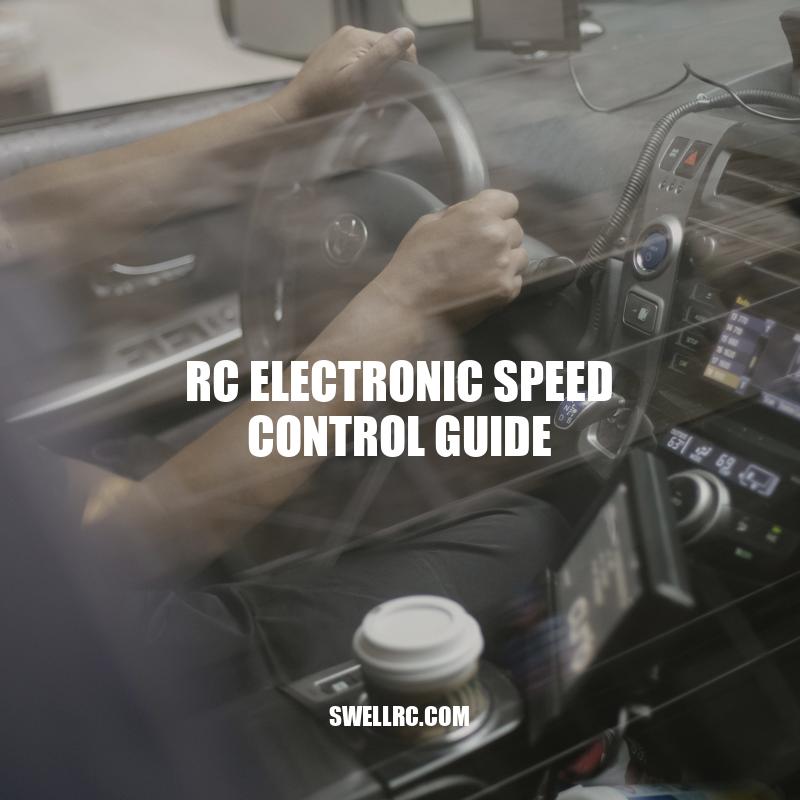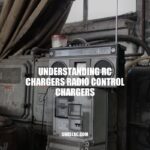RC Electronic Speed Control Guide: Tips for Optimal Performance
RC Electronic Speed Control Guide
RC Electronic Speed Control (ESC) is a critical component in the world of RC toys, particularly for cars and planes. An ESC acts as a mediator between the battery and motor, regulating power delivery to the motor. The ESC is responsible for controlling the speed of the motor, and in turn, the speed and direction of the vehicle or plane. Therefore, selecting the right ESC can significantly impact the performance and longevity of your RC vehicle or plane.
When it comes to ESCs, there are two main types: Brushed and Brushless. Brushed ESCs are found in older model RC cars, while Brushless ESCs are more commonly used today, particularly in planes and high-performance cars. Choosing the right type of ESC for your vehicle is essential, as each has its pros and cons. Brushed ESCs, for instance, are cheaper and easier to maintain, but they are less powerful and efficient compared to Brushless ESCs. Brushless ESCs are more expensive but offer high power and speed, allowing for optimal vehicle or plane performance.
Types of ESC
There are mainly two types of ESC, brushed and brushless. Below are the pros and cons of each type:
- Brushed ESC
- Less expensive
- Simple to maintain and replace
- Less powerful and efficient than brushless ESCs
- Brushless ESC
- Much more powerful and efficient than brushed ESCs
- Made for high-performance cars and planes
- More expensive compared to brushed ESCs
It’s important to choose the right type of ESC based on your vehicle and performance desires. For instance, if you have a smaller and less powerful car, a brushed ESC might be the better option. If you want a faster and more efficient vehicle, then a brushless ESC is the way to go.
What is a brushless ESC?
An electronic speed control (ESC) is an essential component of modern electric RC models that controls the speed and direction of the motor. A brushless ESC is specifically designed to work with brushless motors, which are more efficient and durable than their brushed counterparts.
Here are some key points about brushless ESCs:
- They are generally more expensive than brushed ESCs.
- They require a brushless motor with three or more wires.
- They use electronic commutation rather than physical commutation.
- They can provide smoother and more precise motor control.
- They are often found in higher-end RC models.
Brushless ESCs are a must-have for serious RC enthusiasts who want the best performance from their models. Some popular brands of brushless ESCs include Hobbywing, Castle Creations, and Traxxas.
Features to Consider
When choosing an ESC, consider the following features:
| Feature | Description |
|---|---|
| Voltage and current rating | The amount of power the ESC can handle. Higher power is needed for larger motors and more demanding vehicles. |
| Programmability and customization options | Some ESCs can be programmed for different acceleration rates, braking power, and other performance specifications. |
| Thermal protection | ESC can get very hot when under heavy use, so look for ESCs with built-in thermal protection to prevent damage. |
| BEC capability | The Battery Eliminator Circuit allows the ESC to power other components like servos in the car or plane, eliminating the need for a separate battery. |
Interesting fact: Some ESCs come with automatic voltage regulation, making it easier to maintain a consistent power output.
For popular ESC brands and products, we recommend checking out HobbyKing, Castle Creations, and Horizon Hobby.
What are the components used in ESC?
Some of the common components used in Electronic Speed Controller (ESC) are:
- Microcontroller
- Power MOSFETs (Metal Oxide Semiconductor Field Effect Transistors)
- Capacitors
- Resistors
- Printed Circuit Board (PCB)
- Wire connections
These components work in synchronization with each other to control the speed and direction of the motor. You can find different types of ESCs in the market, including those for drones, RC Cars, and airplanes. It’s essential to choose an ESC with the right specifications that match your intended usage. You can shop for ESCs online from websites like Amazon or specialized stores like HobbyKing.
Sizing the ESC
Selecting the right size ESC is crucial for optimal performance and avoiding damage to the vehicle’s electronic components. Here are some factors to consider:
- Motor size: Larger motors require ESCs with higher amp ratings.
- Battery capacity: ESCs need to be compatible with the voltage and capacity of the battery being used.
- Desired performance: Higher performance requires an ESC that can handle higher power output and acceleration rates.
It’s also important to prevent overheating and potential damage to the ESC by keeping an eye on the temperature and avoiding prolonged heavy use. When in doubt, it’s always better to err on the side of caution and choose an ESC with a higher amp rating than you think you’ll need.
Products like the Hobbywing QuicRun Brushless ESC and the Traxxas XL-5 Waterproof ESC offer a range of options to fit different vehicle types and performance needs.
Can you use higher amp ESC than motor?
Yes, you can use a higher amp ESC (Electronic Speed Controller) than the motor. However, it is not recommended to use an ESC with less amperage than the motor. Here are a few things to keep in mind while choosing an ESC:
- Always check the specifications of the motor and ESC before installing them.
- A higher amp ESC won’t harm the motor, but it can be heavy and expensive.
- Using a higher voltage ESC will only help if you want to go faster, but it may reduce the lifespan of your motor.
If you are unsure about which ESC to use, you can consult the manufacturer’s manual or seek advice from RC hobbyists and experts on online forums, such as Reddit or RCGroups.
Installation and Setup
Installing and setting up an ESC in your RC vehicle involves several steps to ensure proper functionality. Here are some key considerations:
- Mounting the ESC: Choose a location that allows for proper ventilation and is away from other sensitive electronic components.
- Wiring: Connect the ESC to the motor, battery, and receiver according to the manufacturer’s instructions.
- Calibration: Most ESCs require calibration with the transmitter to ensure accurate speed control.
- Programming: Many ESCs have customizable settings that allow for adjustments to speed, acceleration, and braking.
It’s important to carefully follow the manufacturer’s instructions during installation and setup to prevent damage to the ESC, motor, or other electronics. Websites like Horizon Hobby and RC Planet offer tutorials and guides to help with ESC installation and programming. Additionally, products like the Castle Creations Field Link Portable Programmer and the SkyRC Program Box offer easy programming options for different ESC models.
How do you calibrate an ESC motor?
To calibrate an ESC (Electronic Speed Controller) motor, follow these steps:
- Connect the ESC to the receiver and the battery
- Turn on the transmitter and move the throttle stick to the highest position
- Turn on the ESC, it should emit a sound and start beeping
- Lower the throttle stick to the lowest position, the ESC should emit a confirmation sound
- The ESC is now calibrated and ready for use
For more detailed instructions or specific ESC models, check the manufacturer’s website or product manual.
Troubleshooting and Maintenance
While ESCs are generally reliable, occasional issues can arise. Here are some common problems and solutions:
- Overheating: ESCs can overheat if not properly ventilated, causing the system to shut down. Move the ESC to a cooler location or add a fan for better air flow.
- Interference: Interference from other electronics, radio signals or environmental factors can cause glitches or shut-downs. Try changing the operating frequency, using a signal booster or adding shielding to the receiver.
- Short circuits: Short circuits can damage the ESC and other electronics. Check for frayed wires or loose connections, and replace or repair as needed.
To ensure maximum performance and lifespan, regular maintenance is essential. Keep the ESC and vehicle components clean and free of debris or moisture. Check connections and wires periodically for damage or signs of wear. Online RC communities and forums can provide valuable troubleshooting tips and maintenance advice. Additionally, products like the Dynamite ESC Program Card offer a quick and easy way to tune and program ESC settings.
What are the 7 steps of troubleshooting?
Here are the 7 steps of troubleshooting that can help you diagnose and fix issues in a systematic manner:
- Identify the problem
- Establish a theory of probable cause
- Test probable cause theory to determine actual cause
- Establish an action plan and execute it
- Verify full system functionality and, if applicable, implement preventative measures
- Document findings, actions, and outcomes
- Review/Iterate as necessary
These steps are commonly used by IT professionals, but can be applied to any situation that requires systematic problem-solving. Keep in mind that not all issues can be resolved through these steps alone and may require additional resources or expertise.
If you are experiencing technical issues with a website or product, consulting the vendor’s documentation or support resources can be helpful. Many companies offer troubleshooting guides, forums, or chat support to help customers troubleshoot and resolve issues.
Conclusion
Selecting the right electronic speed control is crucial for achieving top performance and efficiency in your RC vehicle. With a basic understanding of ESC types, features and sizing, you can choose an ESC that is suitable for your vehicle and driving style. Proper installation and calibration, as well as regular maintenance, will help ensure the ESC performs to its full potential and has a long lifespan. Don’t hesitate to seek advice and guidance from fellow hobbyists or RC online forums, as well as consult the manufacturer’s instructions and resources. With some care and attention, your ESC will provide reliable and rewarding performance for your RC adventures.



